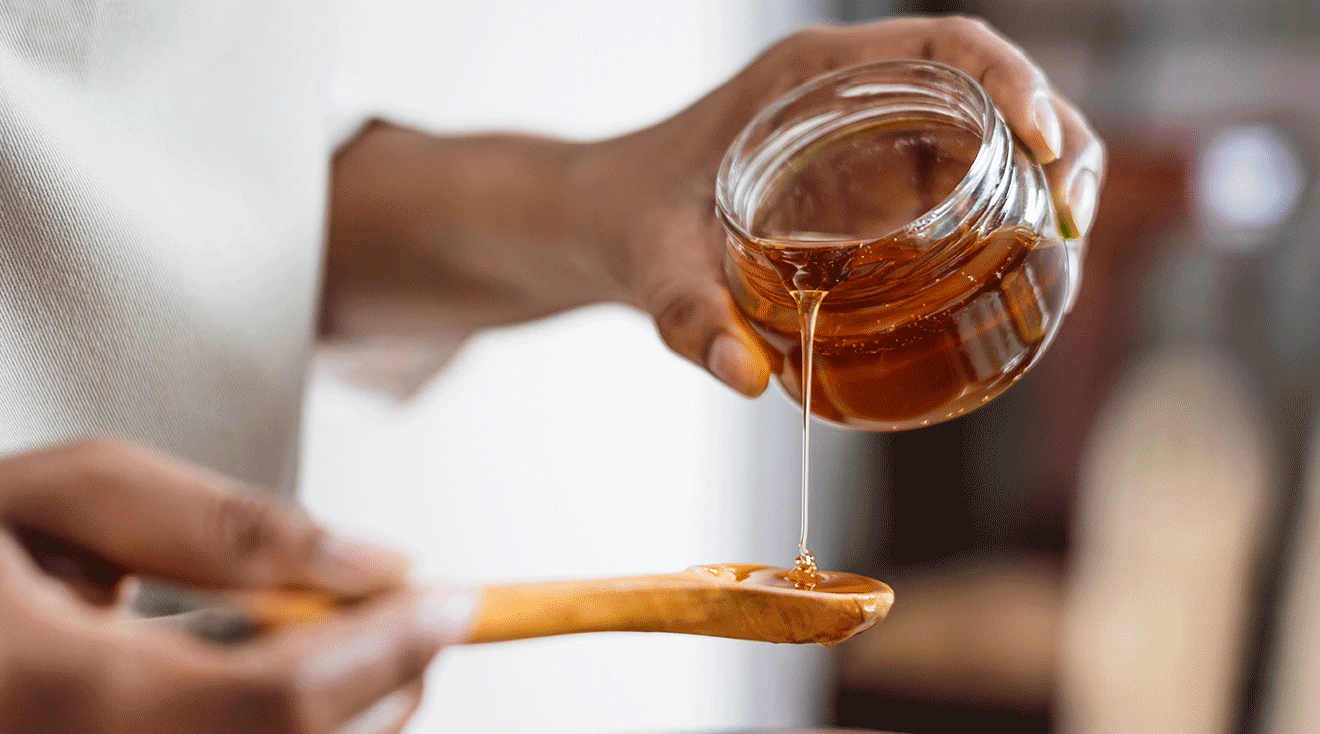Can You Have Honey While Pregnant?
You’ve probably heard that honey shouldn’t be given to babies under one. But can you have honey while pregnant—or should you avoid that sweet golden goodness when you’re expecting? Suffice it to say, there are definitely some important dos and don’ts to know when it comes to having honey during pregnancy. Here’s what the experts have to say.
Can you eat honey while pregnant? If you’re a honey lover, rest assured that you can still enjoy your favorite sweetener. In general, it’s considered safe to eat honey during pregnancy. But if you’re feeling some hesitation, you’re not alone.
In very rare cases, honey may contain bacteria that can lead to botulism, a serious illness that attacks and poisons the body’s nervous system (this is why babies under one aren’t supposed to have it). The good news? “The body’s natural defenses typically stop the bacteria from multiplying, making it safe for adult consumption,” says Melissa Dean, LM, CPM, a certified professional midwife and the founder of Casa Natal Birth and Wellness Center in the San Francisco Bay Area. Moreover, in the unlikely event that a mom-to-be does get botulism from honey, research shows it’s unlikely to cross the placenta and affect baby.
Is raw honey safe during pregnancy?
These days there are several different types of honey available in grocery stores or farmer’s markets, including raw honey and pasteurized honey. Raw honey is the pure, untouched form of honey—it’s taken from the honeycomb and essentially put in a jar ready to eat. Unlike other unpasteurized foods (juices, cheese, etc.), raw honey doesn’t contain any foodborne pathogens like salmonella, E. coli and listeria, according to the Mayo Clinic.
Pasteurized honey, on the other hand, goes through a process of high heat to destroy natural yeast and other bacteria, explains Ila Dayananda, MD, MPH, a board-certified ob-gyn and chief medical officer at Oula Health. Unfortunately, this process may consequently remove some of its nutritional components, vitamins and minerals. That said, pasteurization also makes honey smoother and clearer, further reducing the risk of botulism spores.
So is raw honey safe to eat during pregnancy? The answer really depends on who you ask. “Raw honey is the preferred honey when pregnant if you want the antioxidants and natural benefits,” notes Dean. On the other hand, Dayananda says that due to the small increased risk of botulism, pregnant people should avoid consuming raw honey.
Honey is rich in vitamins, minerals and antioxidants, and when you look at eating honey during pregnancy, the benefits are actually pretty impressive. In fact, researchers note that honey has been used as a medicinal ingredient for thousands of years. Here are a few of the benefits of honey during pregnancy, according to the Mayo Clinic:
- Lowers inflammation in the body
- Helps boost antioxidant activity
- Acts as an antibacterial agent
- Helps treat coughs
- Promotes wound healing
- Helps relieve digestive issues
The natural sugars in honey can also be used as a quick energy boost, according to Dayananda. This can be especially helpful since low energy levels and fatigue are chief complaints among pregnant people.
While there’s no set limit for eating honey in pregnancy, moderation is key, as honey has a high sugar content. Excessive intake may lead to weight gain and other health issues, says Munira Dudhbhai, MD, FACOG, a board-certified ob-gyn and founder of Lewisville Women’s Care in Lewisville, Texas.
Plus, while honey is better for you than your typical processed sweetener, it can still cause spikes in blood sugar. Dean says it’s best to limit honey consumption to one or two tablespoons a day during pregnancy to help balance glucose levels.
Most importantly, pregnant women with any form of diabetes, including gestational diabetes, should watch their sugar and carbohydrate intake–and this includes honey. According to UCSF Health, having too much sugar or carbs can move glucose levels out of a normal range, leading to serious blood sugar issues for people with gestational diabetes.
Also, keep in mind that pregnant women experiencing gastrointestinal issues like acid reflux or indigestion may also want to be cautious with honey. Honey is known to worsen GI symptoms in pregnant people, notes Dayananda.
Babies should never be given honey under the age of one. “Babies’ intestines don’t contain enough bacteria to kill botulism so they can become very sick and it could be potentially fatal,” warns Dean. It’s recommended to wait until after baby’s first birthday to introduce honey, as this is when their immune system is strong enough to fight off potential botulism spores.
That said, it is safe to eat honey while breastfeeding a baby under one. According to the California Department of Public Health, botulism isn’t transmitted to baby through breast milk. (In fact, experts recommend breastfeeding as a recovery method for infant botulism.)
Please note: The Bump and the materials and information it contains are not intended to, and do not constitute, medical or other health advice or diagnosis and should not be used as such. You should always consult with a qualified physician or health professional about your specific circumstances.
Munira Dudhbhai, MD, FACOG, is a board-certified ob-gyn and founder of Lewisville Women’s Care in Lewisville, Texas. She completed her residency with NYU-Lutheran Medical Center, SUNY Downstate University in New York City.
Melissa Dean, LM, CPM, is a certified professional midwife and the founder of Casa Natal Birth and Wellness Center in the San Francisco Bay Area. She is a National Midwifery Institute graduate with over 17 years of experience supporting birthing families.
Ila Dayananda, MD, MPH, is a board-certified ob-gyn and the chief medical officer at Oula Health. She completed her medical degree and master’s in public health at Northwestern University’s Feinberg School of Medicine and then pursued an ob-gyn residency at the Beth Israel Deaconess Medical Center in Boston.
Centers for Disease Control and Prevention, Botulism, June 2022
Canada Family Physician, Botulinum toxin type A in pregnancy, November 2013
Iranian Journal of Basic Medical Sciences, Traditional and Modern Uses of Natural Honey in Human Diseases: A Review, June 2013
Mayo Clinic, Honey, August 2023
UCSF Health, Dietary Recommendations for Gestational Diabetes
California Department of Public Health, Frequently Asked Questions (FAQs) about Infant Botulism
Learn how we ensure the accuracy of our content through our editorial and medical review process.
Navigate forward to interact with the calendar and select a date. Press the question mark key to get the keyboard shortcuts for changing dates.





















































